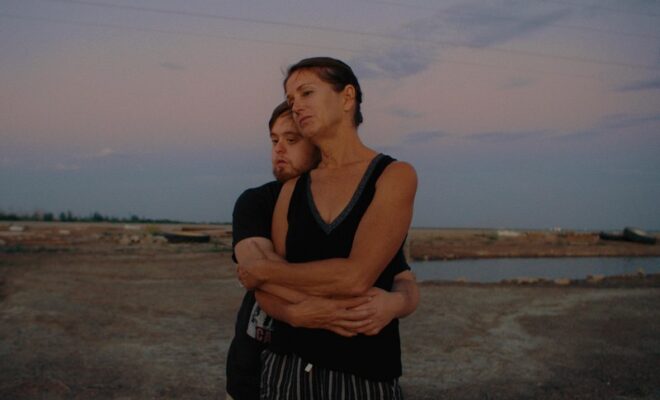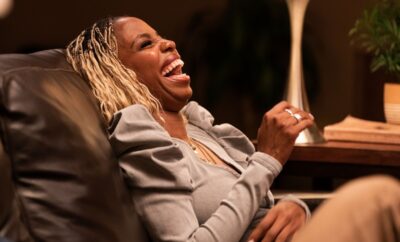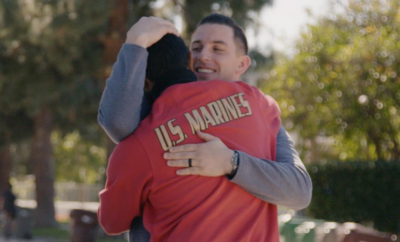 Alex Herz
Alex Herz
Interviews
Alex Herz – Middleground
By: Mariah Thomas
Q) How would you describe your style of filmmaking?
A) Good question! It varies depending on whether or not I am working on a narrative fiction or documentary project. In this case — a short doc — I would probably describe my style as verité, or minimalist, while being emotionally intimate and raw. To me, making this kind of documentary feels like indulging in a very pure form of filmmaking, and I try to do everything with as small a budget as I possibly can.
Q) What inspired you to open your family’s experiences with special needs to the world?
A) Growing up with a brother with Down syndrome was an extremely formative experience for me as an artist and directly affected my interests as a filmmaker. From a young age, I’ve featured characters with disabilities in my work and have tried to paint as accurate a picture as possible of what it means to live life with a disability in today’s world. My first larger attempt at this was my debut feature film A Normal Life, a narrative fiction project that is based on my experience leaving my brother at home to attend college my freshman year. From there, Middleground felt like a natural progression.
Q) Middleground captures this almost “fly on the wall’ perspective.” How did you accomplish this?
A) I knew from the beginning of the process that this documentary would only work if the viewer felt like they were actually in the room with the subjects. To that end, this was a very small production process — just myself with a camera and a basic audio set up. I also took steps to make sure that my presence in the room felt as natural as possible to everyone involved, such as living in the house with them in Fresno for long stretches of time.
Q) This documentary partially follows your brother’s story and there are family moments. However, you aren’t present. (of course, only behind the camera) Was this an intentional choice?
A) Definitely! As mentioned, I felt from the very beginning of the process that I should keep myself out of the documentary as much as possible, since I wanted the focus to remain on the interns and their achievements. I also wanted to give the viewer the impression of physically being with them rather than watching from a distance — that these are friends and colleagues rather than “subjects.”
While I think it would be naive to say that my presence in the room did not at all effect how everyone was acting or feeling, I was surprised by how much I was able to blend in. Once everyone got used to me being there, they just went about their daily lives.
Q) Were there certain aspects of your life, your mother or brother’s lives that you were nervous to showcase?
A) There wasn’t any aspect in particular that I was nervous to show on camera; however, whenever you are making a subject-based documentary (especially about family) there are all sorts of ethical and privacy considerations to take into account. Since we were all living together in a small house for two weeks, I made an effort to draw a hard line and respect personal space, forgoing any filming when I didn’t have any clear consent or when what I was capturing wasn’t something that I felt should be on camera. It’s important to push boundaries as a filmmaker and try to show things to the audience that they aren’t used to seeing, but at the end of the day everyone on the other side of the camera is a person, and that comes first.
Q) What was important to telling this story through the lens of this transitional period for the internships?
A) When my mom first told me about her experience in Fresno — that she would be living with my brother and his colleagues in an Airbnb while they sorted out their permanent living situation — it sort of clicked for me right away that it would be a fascinating experience to document on film. One, because most viewers aren’t really aware of what young adults with disabilities end up doing after they graduate from school. And two, because I thought this interim housing situation functioned as a kind of perfect metaphor for the totality of the disability support system — one wracked with inconsistencies in which the gaps are filled in by a handful of amazing people who really care.
Q) There are many moments Karen is framed as a “superhero” mom, taking lead when needed. What was it like to film these moments?
A) You know, it’s interesting — probably because I’m so accustomed to the way my mom moves through the world, these moments didn’t particularly stand out to me as I was filming them. The exception to this is the moment at the end of the film where she says goodbye to Griffin and they both cry in the parking lot. I felt like I was capturing something there that, as a documentary filmmaker, you only get a couple of times in your life. It’s such a beautiful moment and speaks to the underlying heartbreak of everything my mom has done for my brother.
Q) I am sure your mom doesn’t always feel like a superhero. Does the title weigh on her shoulders or does she wear it like a badge of honor?
A) I don’t want to speak for my mom, but I wouldn’t say she describes herself as feeling like a superhero. If anything, I think everything depicted in the film is very matter of fact for her: just a handful of necessary moments that need to be taken care of in the long span of Griffin’s life. That’s not to say she doesn’t feel the emotional weight of what is happening, but it’s just that I don’t think she views herself through that particular lens. Personally, I think she and my dad are incredible parents, but you’d be hard pressed to get them to take any credit for it.
Q) Although the focus of Middleground is an individual look at California’s disability support system, you still capture the beauty and essence of Fresno. How do you balance that from a storytelling perspective?
A) From the very beginning, the natural setting of Fresno felt inextricable from the subject matter of the film. Fresno is a fairly large city in the middle of California’s central valley, a sort of beautiful liminal space among the endless stretches of agricultural fields. In that sense, it felt like it related quite strongly to what was happening with my brother and his colleagues. In particular, one setting that I felt had to be in the film is Tulare Lake, a large body of water about an hour from Fresno that only reappears during rainy seasons in California. Something about the impermanent nature of the lake felt very poignant to me, which is why it is featured so prominently throughout the film.
Q) This documentary captures such a beautiful and monumental moment in Griffin’s life. What were your family’s reactions to seeing this and knowing your plans to film?
A) I was very lucky in the sense that my family members were incredibly receptive when I mentioned that I wanted to turn this experience in Fresno into a documentary. There was very little resistance to me filming them on a daily basis. When I first showed everyone a cut of the documentary, we all cried, which I think is a good sign!
Q) There was a docuseries on A&E some years ago called “Born This Way” (2015-2018) that followed young adults with Down syndrome and this film reminded me so much of that beloved program. I feel like Middleground showcases there are even greater opportunities for special needs individuals these days. How far have we come with programs to help special needs individuals become more independent?
A) This is a really great question, and I’m a huge fan of “Born This Way,” so thanks for giving it a shoutout! Having observed the process my brother and his colleagues go through in the documentary, I think programs like Project SEARCH are doing incredible work and are crucial to helping individuals with disabilities become more independent. That said, as the documentary explores, we still have a long way to go in ensuring that these young adults are supported not just throughout their journey to finding employment, but throughout the remainder of their lives. My dream is that this project sparks notable action in this regard, or at the very least increases people’s awareness about the disability support system.
Q) What do you want people to take away after seeing this?
A) I think there are two large takeaways from this film, both of which came about naturally as I was documenting everyone’s experiences. The first is the power of moms and motherhood. Especially within the context of the disability experience, moms often take on an outsized role as both parent and long-term caretaker and are pretty much the only reason anything ever gets done. I think viewers can see that not just through Karen, but also Griffin’s coach Nicole, who epitomizes everything that is good and beautiful about what it means to show up for people with disabilities. The second takeaway is that “independence” is not a catch-all term. Our culture puts such a strong emphasis on one particular form of independence — go to college, find a job and live on your own. But the reality is there are so many ways to live, especially within the disability community, that are still wholly independent and fulfilling.
Q) With this being a short documentary, are there possible plans to turn this into a full feature film?
A) I would love that, especially if we could find the funding and there was enough interest! It likely wouldn’t be the exact same story, since this film is so contingent on a particular moment in time, but I would love to continue to explore in-depth what it means to be independent in the disability community.
Q) What are the other projects that you have been busy working on behind the camera?
A) Right now, I’m working on a Reels/TikTok series called “My Girlfriend Turned Into a Worm,” which I started back in June and has garnered over thirty million collective views online. The premise is kind of silly — essentially, in this world, my girlfriend has become a worm, so I do what I can to care for her and make her feel loved. Like Middleground, the series has this sort of heart of emotional tenderness and affection that I try to highlight in my work.





You must be logged in to post a comment Login